Os Portugueses têm uma tendencia inevitável para não acreditarem nas suas capacidades, independentemente da gravidade das situações que se apresentam. É vulgar considerarmo-nos um dos piores povos de todo o mundo, tal como o nosso país. Espantosamente, quem vê de fora, não vê o mesmo... se calhar uma questão de vivências...
Sérgio
A fan's guide to the real Portugal.
As Euro 2004 nears, Michael Pye explains why he fell in love with his adopted homeland's nostalgia, exhibitionism and community spirit – and why he won't be sticking around to welcome.
(Author Michael PyeDATE: 07 Jun 2004)
We are at the blind end of a side road, with a cluster of pale houses in a pine forest, the smell of bread baking and mint underfoot. The wild pigs leave prints on the fields like a bar girl's stilettos and the eagles soar above us. In winter, we can hear wolves; I once ran in the woods alongside a great grey animal, pacing it, eyeing it, trying to tell myself it was just a grey fox, probably.
A world apart: away from the cities, life in Portugal hasn't changed in a century
This is my Portugal, a wild and generous place, where I have spent so much time in the past 10 years. Just long enough, in fact, to be trusted to hear its secrets.
It is a far cry from the touristy Algarve – all golf greens and beer, sand and concrete, a kind of seaside crust on a landscape of olive and almond trees. Or from Lisbon, where Italian eyes water at the sight of so many Ferraris, and where the waterfront clubs are furiously alive at four in the morning. There, you can't miss the rows of yellow cranes, sticking up in a sea of construction sites: Portugal missed half of the 20th century, a whole world war and 50 years of economic growth. Now, everyone is in a terrible hurry to catch up.
Older neighbours say it's not safe any more at night in the small nearby town, not since the younger generation discovered drugs. The town of Braganca, which is a glorious castle in the mountains with a suburb attached, has got a new reputation: discos with bedrooms and Brazilian bar girls.
But here in Coimbra, in my Portugal, there's nothing like that. This is a frontier state, where Europe meets Africa and the Atlantic: perpetually interesting, sometimes downright risky, a wild mix of unfamiliar and wonderful things.
It makes me nervous to think what other people will make of this place – what works, and what doesn't – when Europe's gaze turns on Portugal for the duration of one of the world's biggest sporting events. And I'm not sure I want to be here when the Portuguese of these inland towns discover what the English can be like when they travel in mobs, especially on the tight streets of a medieval town like Coimbra on a hot night. I want everything to be a triumph, but I am not at all sure it will be. So I won't be sticking around to welcome the England fans, although I won't be gone for long.
For there's everything still to discover – some of the great red wines of Europe, which vary so much year by year that a label means very little; a lost Renaissance of unknown painters, Italianate churches and sometimes exquisite fountains, shoehorned between municipal slabs; walled forests of cedar and camellia; the two great, melancholy song traditions called fado – the dockside Lisbon one, about the life you've lived and how hard it was, and the Coimbra one, about the life you'd love to live, if only the girl on the balcony would just come down.
But you can't miss the fact – there are monuments to it – that the national pastime is "saudade". The word means nostalgia, but only in the sense that the word "hurricane" means a wind. Nothing makes sense in Portugal without all the myths and shadows of the past.
The great time was the age of discoveries, when Portugal opened up the globe and rivalled Spain; until Spain took it over. And you can still start a fight by asking why Vasco da Gama seems to be buried in three places.
The Portuguese were defined by the roar of the Atlantic and the chance to get away: between 1580 and 1640, in tiny, fragile ships, almost a third of the population of Portugal went out to Brazil – some 300,000 souls. Since then, there has hardly been a time when the Portuguese didn't leave their bare mountains, rough seas and narrow riverbeds for anything that sounded better; "saudade" is the passion tugging at an exile's heart.
Portugal chucked out the Spanish in 1640 and there were a few more glory days: the huge riches of Brazilian mines, which crusted whole churches in gold. It didn't last. The British and French came rampaging and pillaging in the ruinous Peninsular War. After that, Portugal became a kind of low-rent colony for the British, who ran the wine business as we did in Bordeaux. People remember our old alliance, but they also know about the Victorian connection. "You are very close to us," one Lisboeta told me once. "Close enough to screw us properly."
There were whole centuries when nothing worked – not ruling Portugal from Brazil, not driving out the Jews, which stopped international trading short, nor driving out the religious orders and the Jesuits, which put learning on hold.
Nor getting rid of the royals; you still find the pretender, the Duke of Braganza, in the gossip columns. In desperation, the Portuguese handed a bankrupt country to a professor of economics: Antonio Salazar.
Salazar was a dictator, devoted to the past. He loved gold. He made up traditions as he went along; he took the "traditional dress" from a postcard from 1940s Peru. And he was a harder-line Marxist than Marx himself. Capitalism, he was sure, would lead to communism; so he was determined to save Portugal from capitalism.
The country froze for almost 50 years. Our neighbours walked barefoot for 20 miles to buy sardines and sell them in the village. One woman, pregnant, had to be carried 10 miles on an old door just to find a road where an ambulance could pass. And when I asked another neighbour why he went to France to work in the Fifties, he just said: "Hunger." He said he left a note for his wife, even though she couldn't read.
In the Fifties, too, the secret police – the PIDE – paid one in five of the population. You could be reported to them for wearing a red shirt in public. It's true that their reports were quite usually misfiled, but it was a bloody kind of farce.
Portugal stood "proudly alone", tangled up with its African colonies – including Mozambique and Angola – and still proud of owning Goa and Macao and Timor; Salazar said it needed nothing else. It took a military revolution to settle the long colonial wars and bring democracy in the 1970s. And then, for the first time in centuries, there were choices.
You still hear people talking about democracy, caring about it, because they remember not having it, in the days when "you had to be quiet round the table".
But if you never had a 20th century, it's tough to get the 21st right. People still sound more resigned than angry when things go wrong; the phrase you hear most is "tem que ser" – that's how it has to be. Even the Portuguese acknowledge that their word for tomorrow – amãnha – makes the Spanish mãnana sound urgent.
Earning respect – respeito – and keeping up appearances are everything. There was a phrase in the last days of slaving that sums it all up – doing things "for the English to see", and then getting on with the real business, out of sight. So, hierarchy matters, and bureaucracy is astonishing; you learn to carry "papers" in great sheaves; reality becomes what officials say it is.
The last prime minister opened our local by-pass four years ago with headlines and pomp; we're still waiting for someone to fill in the hundred-metre gaps, so that we can actually drive on it. The sleek, efficient tilting trains that run between Porto and Lisbon can't actually tilt, because the tracks were built too close together.
These social games can become deadly. The death rate on Portuguese roads is the worst in Europe; the IP3 road is known, by everyone, as "The Highway of Death". Part of the reason is just how competitive and status-concious drivers are: tight convoys enforce their pecking order on blind bends with constant overtakes and cut-ins, like dodgems. Not everyone driving has a licence.
Show matters so much that there's always a barrage of fireworks to announce every day of every tiny village's four-day festa – which prove you have money to burn, even in the hot, dry summers when pine is like tinder and eucalyptus can go up like a rocket, too.
The new football stadiums for Euro 2004 sum up the showy mood: they are big enough to hold every inhabitant of some towns where they squat and shine. They are spectacular monuments, but in a few weeks, most of them will be redundant. Democratic Portugal is using the same tactics as old man Salazar: use soccer to take people's minds off reality. But it is just glitz laid over mud, an impression of flashy riches to disguise terrible poverty. The arrival of Beckham and company won't help the elderly ladies who get up at five to join the long queues for the local health centre, so that, at nine o'clock, they will have a chance of an appointment. Henry and Zidane won't help the teachers without jobs in a country that is in desperate need of better, tougher schools.
Portugal remains a quilt of small towns, with nothing much in the way of government between the local mayor and the prime minister. This makes life very cosy for a few, but, on the whole, Portugal is a nation without all of the machinery it really needs. Everything runs according to who knows whom, and everyone needs "cunha" – the "wedge" of influence. It is said that it's wise to dine with two judges, of different political parties.
Such an arrangement causes problems. In our village, we had our revolution in 1989. The village broke off from its neighbour after a couple of nights of sudden raids with shotguns and pick-axes on barricaded houses. The issue was water, of course, and land; but, mostly, a stolen statue of Saint Lucia. People were in fear of their lives, but they didn't even think of calling the police.
The flipside is that here, in my Portugal, in the village where I write, there is a wonderful solidarity. We have each other, nothing else. We work together, like a machine. Nobody dies alone; everyone stays with the sick to the very end, and then through the night with the ones who are left. There is a habit, almost a system, of giving to each other: a loaf of bread here, a cut from a strong patch of parsley there, some beans, meat from a newly killed pig.
You are allowed to be kind, to be thoughtful, to try to make a community away from the indifference of life in great cities. And that is what will tug me back to Portugal – my Portugal – as soon as the football fans have gone home.
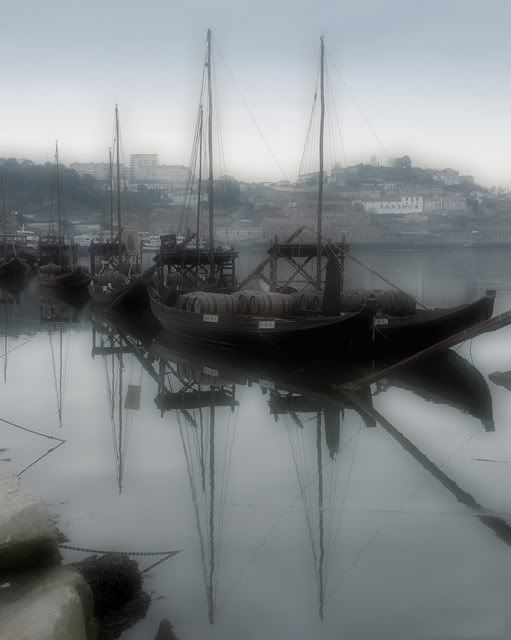



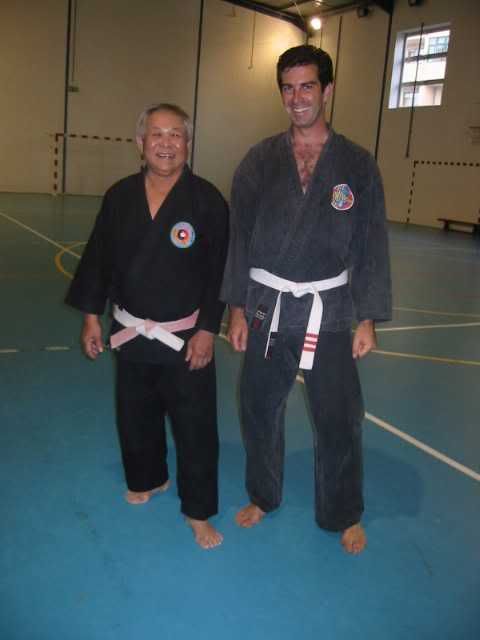
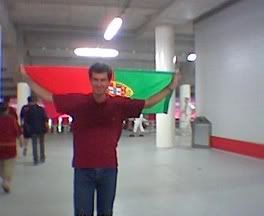
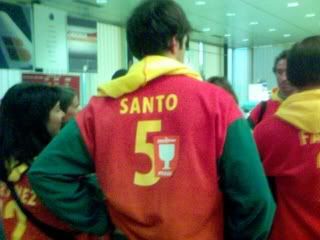


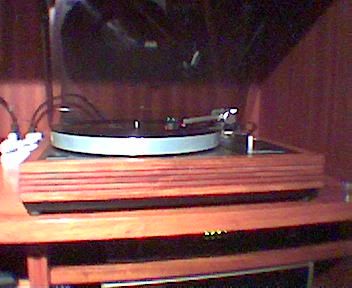
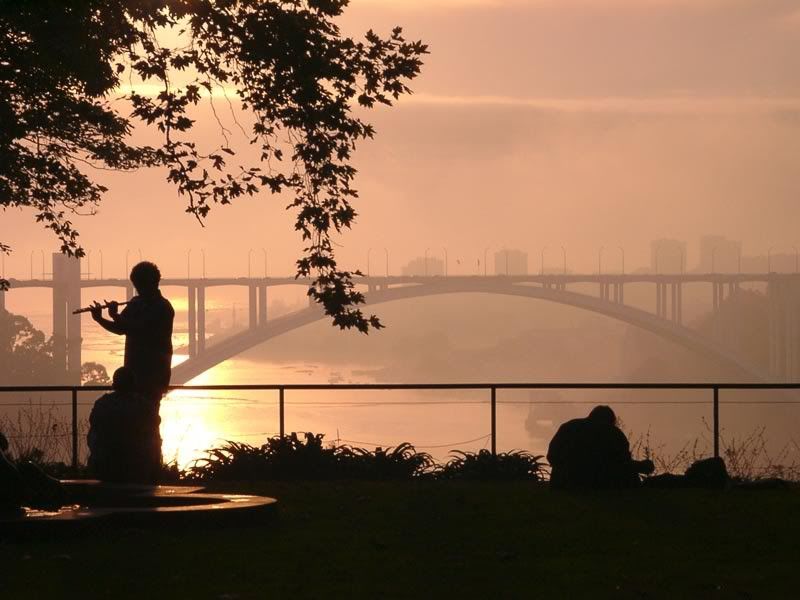

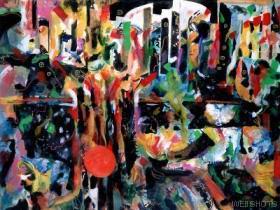 Hoje deixo-vos com uma história que me habituei a ouvir da minha avó materna (que escrevia quase sempre a lápis). Só é pena que tenha encontrado este texto em Brasileiro... Mais do que a mensagem, vale pela nostalgia...
Hoje deixo-vos com uma história que me habituei a ouvir da minha avó materna (que escrevia quase sempre a lápis). Só é pena que tenha encontrado este texto em Brasileiro... Mais do que a mensagem, vale pela nostalgia...
